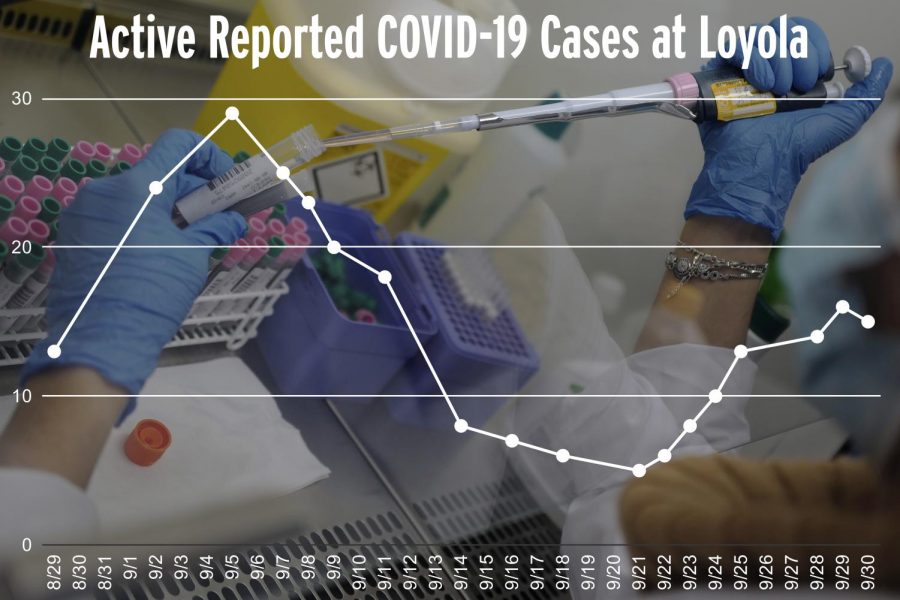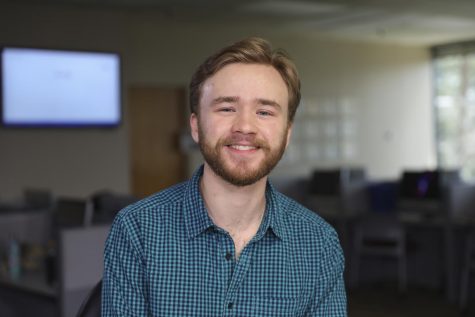Tetlow explains lack of COVID-19 testing, data tracking
Data collected from Loyola University New Orleans
October 1, 2020
With more than a month into the school year, University President Tania Tetlow said the university has been able to operate safely and efficiently thus far despite the lack of mandatory testing which has been criticized by many students.
“The fact that we can engage with campus and see each other even in this surreal new reality is a very big deal,” Tetlow said.
Loyola has been updating its website regularly with the number of active cases of COVID-19 daily, but has not regularly published the tracking of active cases or the cumulative number of people who have had the virus.
Tetlow said the university wanted to publish daily active case numbers for transparency.
“It was important to us to be transparent in that data so that you know at any one moment where we are,” Tetlow said.
Tetlow said that she believes cumulative case numbers can be misleading, citing that Louisiana’s total numbers are often reported without noting that the majority of them are from earlier months. She said that the university wanted to focus on “relevant numbers.”
While she said she has heard the criticism about the lack of required testing, the university does not have the means to provide widespread testing and could not find a supplier willing to sell rapid tests to Loyola. But Tetlow also said that health officials advised her that if Loyola were to obtain access to a large number of tests, those tests would likely be more critically needed elsewhere.
“If you bent over backwards to find a way to get them, they are needed for populations that are more vulnerable than your generally young and healthy population that you serve,” Tetlow said officials advised her.
According to Tetlow, the decision has been reaffirmed by community testing hosted at Loyola in early September which yielded two positive tests, one among students and one among staff members.
“It’s not just that we don’t know about COVID in our midst, because there is inevitably some asymptomatic cases we won’t know about, but that we really are doing well,” Tetlow said.
She said the university’s primary goal has been to persuade students into achieving public health compliance.
“We focused on persuading students and faculty and staff to pay attention to the protocols based on two arguments, one is our common values and that’s a particularly powerful argument at Loyola and the second is just self-interest,” Tetlow said.
Campus community members who violate the university’s COVID-19 policies will face a set of three strike enforcements escalating in penalty with each offense.
“The ultimate penalty we have at least for students who live on campus is the ability to say you can still participate in Loyola and take all of your classes but you can not live on our campus,” Tetlow said. “You have to go virtual.”
However, Chief Student Affairs Officer Alicia Bourque said that cases are decided on an individual basis.
“It’s important to note too that a level can be skipped if the offense is egregious, if the student has prior conduct history, and/or if the student shows no intention of changing their behavior,” Bourque said.
But she said most students are given the opportunity to correct their behavior through educational sanctions.
As of Sept. 28, there have been 39 reports of students failing to adhere to the university’s COVID-19 administrative instructions, 47 reports of students not wearing a face mask and 41 reports of failed social distancing practices, according to Bourque.
There has been fewer than ten students who have been cited for a re-offense, she said.
While there have been some first and second offense public health compliance-related conduct cases, Tetlow said she did not know of any offenses that resulted in students being removed from campus.
This story has been updated as of 1:47 p.m. Oct. 1. A previous version said that Alicia Bourque is the Executive Director of Student Conduct, but she is the Chief Student Affairs Officer. The story has been updated to reflect this context.









